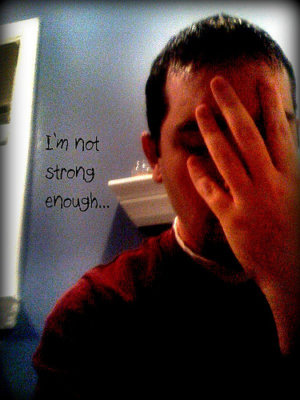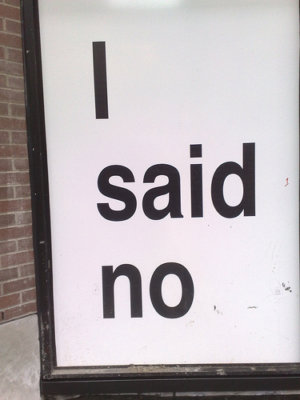Hate to Let Others Down? How to Be Better At Saying No

By: bp6316
by Andrea M. Darcy
Perhaps you tell yourself it makes your life easier to just say yes all the time, or that it’s just the way you are, a ‘nice’ person.
But it’s actually more about lacking personal boundaries, and in the long run not knowing how to say no to others can have serious consequences for your relationships and your mental health.
[Don’t believe it? Read our connected piece, “The Psychological Cost of Never Saying No“.]
How to Say No and Be Taken Seriously
Of course knowing the dangers of always saying yes is one thing, actually saying no more confidently is another. Adult peer pressure is a real thing we can come up against. But use the below tips to start saying saying no effectively.
1. Think calm and confident.

By: Cindy Sharp
The real secret to saying no is to speak it from a calm, confident place. But if you are not the type to ever say no, it’s more than likely the very thought of doing so makes you feel anything but assured.
If that’s the case, ‘borrow’ confidence. We all have some areas of our life we feel good about, even if it’s just that we know we make a mean Thai curry. Try visualising in your mind’s eye the thing you do feel confident about as you have the conversation in which you let someone down.
This will give you more of an air of confidence that inspires the other person to believe your no, which will, incidentally, increase your confidence. An educated take on ‘fake it until you make it’? Perhaps. But needs must.
2. Try relaxation techniques in advance.
If you know a big conversation awaits where you are going to have to say no, take time to relax. A few minutes of mindfulness meditation can do wonders, as can deep breathing, or progressive muscle relaxation.
3. Use positive body language.
Make sure your body isn’t saying yes as you are saying no. If you are weaving side to side, shifting from foot to foot, and using a soft voice, you might very well be seen as undecided.
Stand firmly, your shoulders straight, and speak clearly. It can help to also gently nod your head no as you say no.
Just changing your body language might even make you feel more confident – read more in our article, ‘The Power of Body Language to Change Your Mood‘.
4. Keep reasons and excuses out of it.
The second you start defending your position you are actually creating a doorway for debate. And that means you are inviting the other person to talk you right in to saying yes. No is a full sentence. Don’t follow it with ‘because’. If they ask why, just say no again in a different way (see the next step for hints).
5. Say no simply, clearly, and politely.

By: Roland Tanglao
There is no need to shout ‘no!’ in a way that has people think there is something wrong. Just say no in a polite way. There are many ways to do this.
Use variations, such as:
- No, I can’t.
- I’m afraid not.
- Not this time.
- It’s not possible.
- Sorry, but no.
- It can’t happen.
- Some other time.
- That is definitely not for me, but thanks.
6. Use the broken record technique.
If you have never said no to someone before they might not take you seriously at first. Instead of getting upset or defensive, trying to make excuses, or giving those reasons (again, all of which only give the other person room to argue you into a yes), try to just repeat the same thing again and again, firmly. “No, I can’t. Not possible. I understand, but no. Okay, but no”. Eventually, they will back down.
7. End the conversation or change the subject once you’ve said no.
The problem with saying no after years of saying yes is that as soon as you’ve actually done it and the other person accepts it, you are likely to go into guilt mode and suddenly say ‘then again’, or ‘maybe’, or ‘I haven’t upset you, have I….”
You might even convince yourself you have made a mistake and you truly do want to help them. You don’t. You just feel uncomfortable with your new found power.
So do yourself a favour and change the subject. Or, better yet, make an exit.
When in doubt, stall!
If someone springs a conversation on you, demanding something without notice, remember, you don’t owe them an answer. You owe yourself time to know what you really want.
Tell them you have to think about it, or discuss it with your partner, or look at your diary. And if they don’t accept this, again, use the broken record technique, and end the conversation. Do not let yourself be bullied.
But what if I don’t know what I do or don’t want?
One of the biggest problems when we decide it’s time to say no to others and yes to ourselves is that the very sort of person who spends decades being agreeable is the very sort of person who has a weak sense of self. Somewhere along the way, after spending years going along with the plans of others, your own likes and dislikes get lost in the fray.

By: Sarah
If you make the big decision to finally say no, but feel like so far there is not a lot to say no to, it’s not that you aren’t being challenged. It’s far more likely you have long lost any radar for what you do and don’t like and are just saying yes to everything still, not matter what you are telling yourself.
So step one to being better at saying no – start to invest serious time in learning more about yourself. What actually brings you joy? What makes you tired? What makes you feel good inside? Whose company do you actually like?
Journaling can be a great start to getting to know more about yourself. Try not to sensor yourself when you write. If it helps you relax and get honest, commit to ripping up what you wrote after.
Start to get in touch with your emotional radar. Again, this can be something you’ve lost sight of and can take a while to do well, so don’t judge yourself if at first it feels confusing. Look for the feeling in your body when facing a decision to say yes or no. Do you feel excited and light? Or do you feel heavy, confused, and a bit tired?
Mindfulness, even if practised for only ten minutes a day, can help you get more in touch with how you are feeling. It brings you out of your worried mind and into what’s going on for you right now, and is a tool many counsellors and psychotherapists are now using with their clients.
Don’t underestimate the value of asking yourself better questions when faced with saying yes or no. It’s easy to freeze up if you just ask yourself ‘do I want to do this or not?” Learn to be more exact and to ask questions that are forward moving (learn more about how to know the difference in our article on the Power of Good Questions). Here are some questions you can start with:
- What would this experience give me that I want?
- Does this choice take me away from something else I would rather do?
- When I think of doing this thing, do you feel energised? Or a little tired and overwhelmed?
- Can I easily think of five things I’d rather do instead? (if so, say no)
- It this person hadn’t of asked me, would I ever have chosen to do this thing by yourself?
- Would I be doing this to make the other person happy, or myself?
Need help saying no?
If you find that no matter how much you want to say no to others and yes to yourself you find it too challenging or overwhelming, reach out for support. A coach can be helpful to help you with your technique and figuring out more of what you want to say no to.
If you worry your inability to say no to others stems from a childhood where you weren’t allowed to have an opinion or watched one of your parents always say yes when he or she wanted to say no, it might be that a counsellor or psychotherapist would be more useful in helping you spot and breakthrough your patterns and rebuild your self-esteem.
 Andrea M. Darcy is a health and wellbeing writer as well as mentor, trained in person-centred counselling and coaching. She often writes about trauma, relationships, and ADHD. Find her on Instagram @am_darcy
Andrea M. Darcy is a health and wellbeing writer as well as mentor, trained in person-centred counselling and coaching. She often writes about trauma, relationships, and ADHD. Find her on Instagram @am_darcy





Thank you for your article. I’m new to setting boundaries. If I start saying no without an explanation (or excuse) people who have been in my life for a long time will think I’m upset with them. Is it appropriate to say, “I’m practicing setting boundaries, and I no longer explain my reasons for declining your invitation”? Or is that just another explanation/excuse? Help!
I’m a highly sensitive person. After writing the above, I recognize that I might be offended with a simple, “no”. Recognition is the first step, right? So, I guess my question is, how do I shift my behavior with people who might see the shift as an offense?